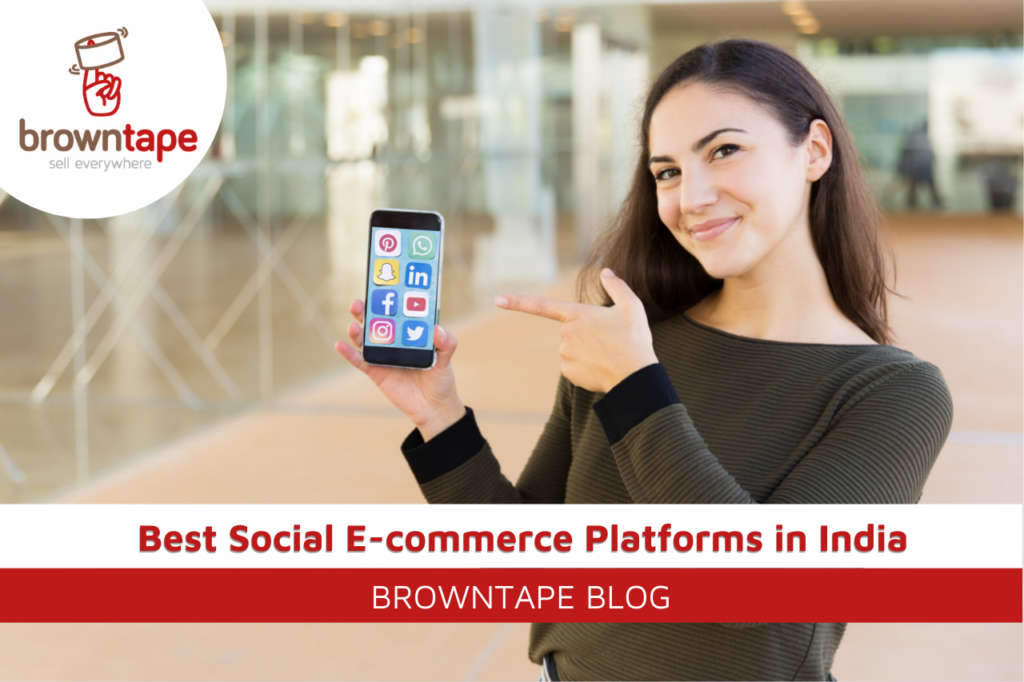
Social eCommerce in India is growing at an immense rate. The growth was inevitable especially in India, due to a major section of the population adopting social media ranging from Facebook, Instagram, and even Tiktok. Social media penetrated tier III and even rural areas with the content being produced in Indian villages. Incidentally, social eCommerce is a trend that is developed in Asia itself and made its way to the rest of the world.
Most businesses are looking for a way to incorporate social eCommerce into their business in India; more so with the COVID pandemic. It is already predicted that social commerce, which is a $1.5- $2 billion market today, will be worth as much as $20 billion in just five years, as per management consulting firm Bain & Company.
How Does Social eCommerce Work in India?
In social eCommerce, one uses social networking sites such as Facebook, Instagram, Pinterest, Twitter to do business. Many entrepreneurs begin their eCommerce journey on social media. Existing sellers enhance their customer shopping experience by incorporating shopping features into social media sites. I.e. allowing them to purchase products without having to visit any other site.
Although globally, this is how social eCommerce functions, in India the lines are blurred. As many social media shopping features aren’t yet introduced in India. So till such features get introduced, sellers follow a hybrid model. This is why social eCommerce sites are on the rise in India. These include sites like Meesho, Shopsy, DealShare, etc. These eCommerce companies have created strong platforms for Indian sellers and resellers to sell products by sharing them on social media sites.
Benefits of Social eCommerce Platforms for Businesses
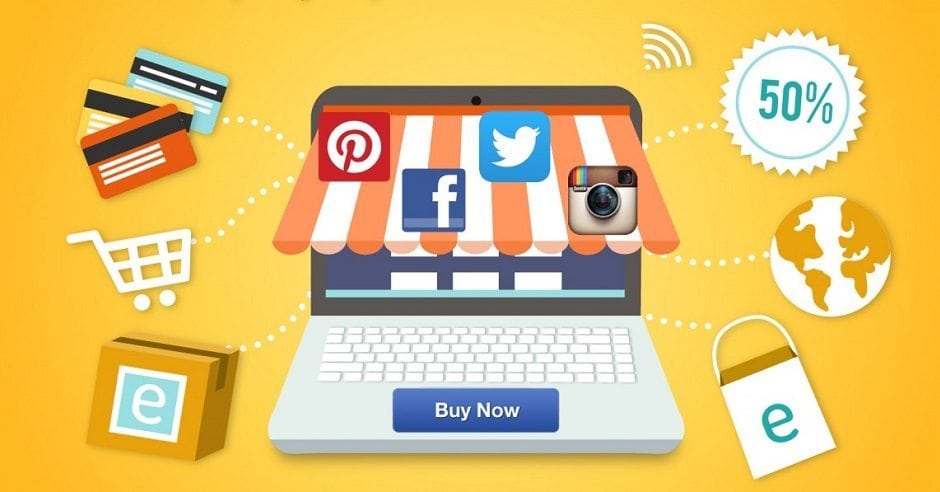
1. Growing audience
Social eCommerce in India is on the rise, with both social media and eCommerce blending into each other. People spend much more time on their social handles making this a great place to cater to an audience. One can do this by:
- Establishing one’s presence on the Facebook marketplace
- Setting up an engaging Instagram page, as a brand manufacturer or as a reseller.
Your customers are already here; it is a matter of reaching them. This can be done by putting visually appealing images, relatable content, using the right keywords, hashtags, and collecting positive feedback from previous customers. These are some steps to reach your desired audience.
2. Build seller base with trust
For a social eCommerce site, items sold are not mainly based on brands. There may be 100s of D2C brand players. However, one will find lakhs of resellers that sell cost-effective products targeting middle-income groups. These in fact might be resellers from sites like Meesho. Here are some of the factors that help build trust.
- A reseller might be operating from his own personal account, hence, his/her network has pre-existing trust in the individual. Social media offers 2-way communication and this is pivotal in adding to the trust factor. So the medium displays the customer reviews and ratings.
- More followers give a customer the impression that you’re a genuine seller with quality products. It increases your social clout.
- A social media eCommerce account with details like contact, name, address, and other verifiable details can establish trust.
- Lastly, word of mouth works great for social eCommerce businesses.
3. Mostly, there is no need for payment gateways
Buying items right from a social eCommerce site does not need a payment gateway as that of the eCommerce site. Since many e-wallets, bank transfers, and other UPI payment options are available. Using these payment modes makes it easier for your customers to make payments and for you as a seller to receive payments. Rather than going through the whole process of acquiring payment gateways for your business. Although if you already have your eCommerce site set up it would be easier for you to use these methods of payment as well.
Besides this, social media platforms like Instagram and WhatsApp in India to have shopping features that allow you to pay via a secure payment gateway.
4. Customer loyalty
Before going ahead and buying a product, if, given the opportunity to watch videos, read reviews, and interact with other customers, people are more likely to buy the product. According to Kinsta, around 73% of customers are more likely to purchase a product or service if they can watch a video regarding the same. So that being said, this is a way to build your customer loyalty. Since on social media, a seller can get directly in touch with customers versus on marketplaces where most details are not revealed due to privacy reasons. Once you have built a relationship with your customers it’s a matter of satisfaction that brings the customers back for repeated sales. Rewarding your most loyal customers with discounts or freebies too can spread the good name of your business.
5. Growth of micro-entrepreneurs
The rise of social eCommerce sites in India has given rise to micro-entrepreneurs. Since sites like Meesho, Shop101, Shopsy, and others form a base for resellers. These resellers could be homemakers, students, youth, or anyone looking for a source of income. They can do this without any prior investment. This makes it easier to set up and functions as a small-scale entrepreneur.
Top Social eCommerce Platforms in India
Meesho
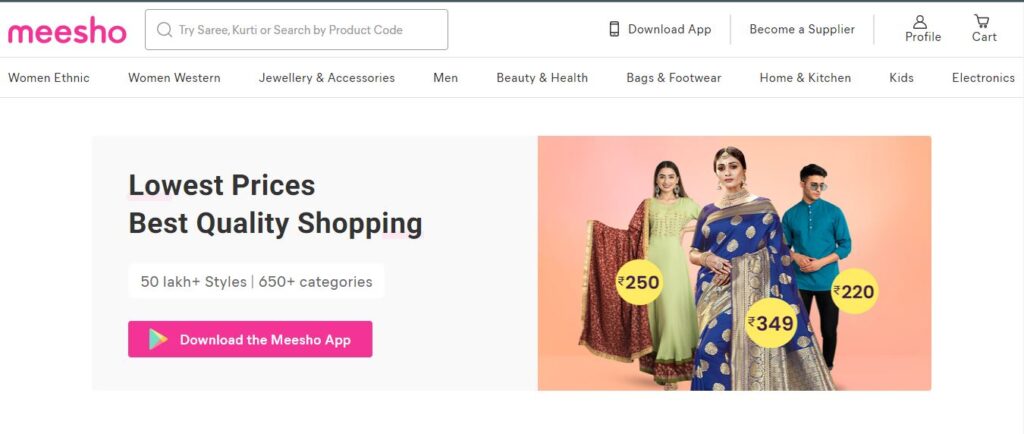
Meesho was founded in 2015 by IIT Delhi graduates Vidit Aatrey and Sanjeev Barnwal. The name Meesho is derived from “Meri shop” or “My shop”. They are headquartered in Banglore. Meesho is one of India’s first social eCommerce sites.
To register as a seller on this site is relatively easy. For an in-depth guide to help you register you can check here. This Indian startup eCommerce platform is developed keeping in mind the small manufacturers and distributors in various categories. Furthermore, it allows them to kick start their business without any prior investment.
Meesho’s target is to reach 100 million monthly transacting users by December 2022. Moreover, increase its product roster to surpass 50 million products. Besides this, the site, Meesho also wants to get onboard 100 million lesser-known brands.
Highlights
- Meesho has around 80% of women, social sellers, onboard.
- The Meesho app is available in 7 different languages.
- Meesho has raised about $4.9 billion in funding with over 8 rounds. The last funding round was on September 30, 2021.
Shopsy
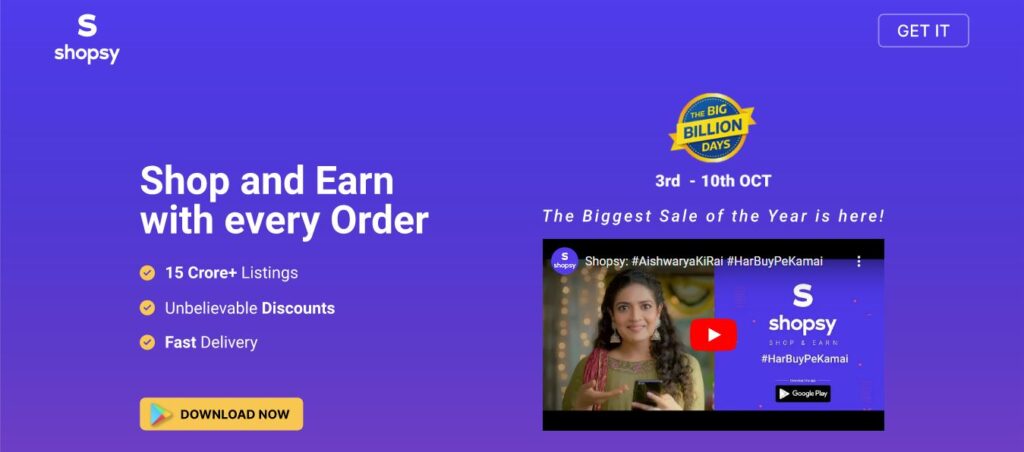
Shopsy is Flipkart’s social eCommerce venture. Of popular, it has been designed keeping in mind small sellers who look to launch a business with zero investment. As a seller, one can register on the site with just their mobile number. After you register on the site, sellers can form catalogs and share them via popular social media apps.
By 2023, Shopsy aims to have 25 million online entrepreneurs onboard. Besides this, users of Shopsy (resellers) can cover and share catalogs of a wide selection of 15 crore products offered by the sellers.
Highlights
- Claimed targeted reach of possibly millions of customers and a critical mass of resellers.
- Furthermore, no brand or trademark registration is required.
Shop101

Shop 101 allows you to have your online store in under two minutes. It was originally founded in 2015 but officially launched in 2016 by Abhinav Jain and Aditya Gupta. They have their headquarters in Mumbai. This app is designed to empower homemakers and students alike. Shopsy markets itself as the most trusted reseller’s app. At the core, they are a platform for manufacturers to sell their products.
Onboarding of manufacturers is easy and this can be achieved by simply filling in essential details. The platform will soon verify you to sell your products on the app as a seller.
Shop101 declares they have around 25-30% month-on-month growth throughout the recent years. Furthermore, they have enabled over 3 lakh entrepreneurs all over India. This start-up has raised around 29 crores (around $3.9 million) new capital from their investors
Highlights
- Along with Shop101, you will reach around 2 crore+ customers.
- Moreover, they have 1 crore+ orders placed and 90 lakh+ registered resellers.
- They provide you with a free training program after you have registered.
Simsim

Simsim is a social eCommerce platform, on which creators or customers can make short video content reviewing a product from any local business. These videos are posted on the app for people to see and even buy the product directly from the video/ app itself.
This is a fairly new app (established in 2019) by Amit Bagaria, Kunal Suri, and Saurabh Vashishtha in Gurugram. To be a part of the seller community on this site you would have to get in touch with the team personally via the contact details provided on their site.
Recently, it has been acquired by Google’s YouTube. To pave their way into the Indian social eCommerce business. Although no further financial details about the same are disclosed. Google’s YouTube acquiring this app is a big step in furthering Simsim’s mission. That of being the foremost platform for the small businesses in India to grow and promote their products. Furthermore, as of now, Simsim has plans to add more than 10 million customers.
Highlights
- One of the first video-based social eCommerce sites in India.
- Video-based content for customers to compare and decide.
- Allows sellers to directly sell their product from the video content itself.
Mall91

This Noida-based social eCommerce start-up was established in 2018 by Nitin Raj Gupta and Shubham Paramhans. Mall91 reaches out to the tier II, III, and IV cities and also villages in India. Furthermore, it has aimed to cover more than 400 million customers speaking vernacular languages.
Being a seller isn’t difficult on this site. Just visit this site and fill in your details and you can be part of the seller community of Mall91. The benefits being, your business can cater to the 10 million+ customers that the site has. Furthermore, Mall91 has managed to raise $7.5 million in a Series A of funding.
Highlights
- Won the Indian government initiative for the Aatmanirbhar Bharat App Innovation Challenge in the Business category
- Combines video-based, local language voice recognition based catalog
- Mainly focused on vernacular speaking population
- Along with this app, you have a WhatsApp-like chat-based checkout.
BulBul

BulBul was founded by Sachin Bhatia (also co-founded TrulyMadly and Ex CMO of MakeMyTrip) and Atit Jain in the year 2018. It is headquartered in Gurgaon, Haryana. The aim of this startup is to assist users in discovering new products through live interactive chat/ video stream.
The social eCommerce site of India claims to have around 4 lakhs+ transactions recorded so far. Besides that, short-form seller videos on the site have views of around 15 million. Now to be a host you can simply visit the site and join the community.
Highlights
- Firstly, the app lets sellers display their products on a live video stream.
- Secondly, this is one of India’s first live-streaming shopping app.
- Moreover, the seller answers any questions of the viewer or buyers too within the video.
- BulBul offers a feature that lets customers ‘group buy’. This lets them add any friends or family to the purchase. Therefore making it a traditional shopping experience on an online platform.
DealShare
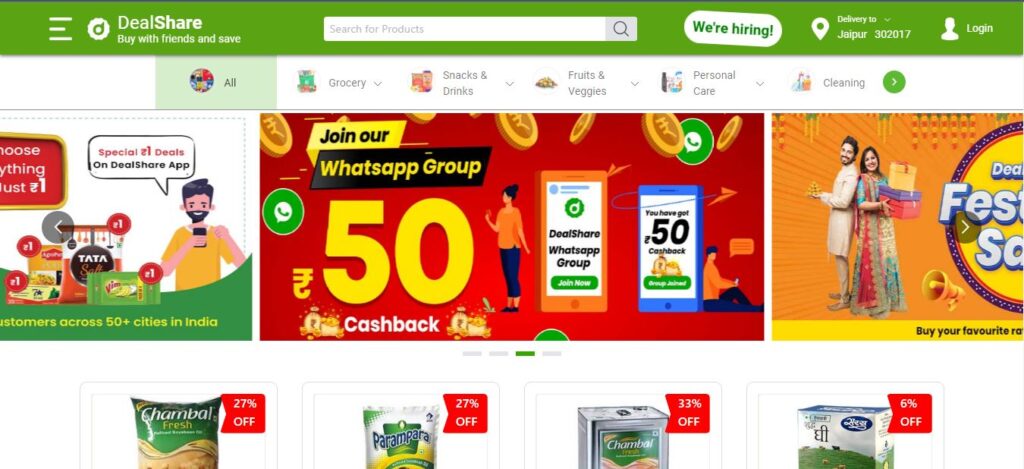
DealShare is a social eCommerce site that has one of the fastest growth rates currently. It was established in 2018 by Rajat Shikhar, Sankar Bora, Sourjyendu Medda, and Vineet Rao. DealShare is headquartered in Jaipur. It is currently available in Rajasthan, Gujarat, Maharashtra, and Karnataka. They cover more than 25 cities across these states. Besides this, they aim to target lower and middle-income groups in tier II and III towns.
DealShare has over 3 million happy customers with 55 thousand orders placed per day. Besides this, around 80-90 percent of the products sold are produced regionally. Meaning, they give preference to local manufacturers.
Highlights
- The deal with multiple product categories right from daily grocery items and perishable goods to other items, all at discounted prices
- Moreover, the app is available in several vernacular languages.
How to Incorporate Social Commerce Features in your eCommerce Store?
If you already have an eCommerce store you can incorporate features of social eCommerce into your business:
Facebook shopping
As an eCommerce store, you can create your own Facebook business page. After which, you can enable Facebook shopping on your page. So your customers can directly buy and get more details from your Facebook posts.
Instagram shopping
Similar to Facebook, it is easier to create if you already have Facebook shopping. For Instagram shopping, the only thing you would have to ensure is that your professional account adheres to the requirement of Instagram. Both these features are popular among the rest of the world but are still in the developing phase in India. Check out how you can do this here.
Third-party integration
Besides the above two, there are other tools that you can integrate into your social media to enhance your customer’s shopping experience. Like posting and displaying reviews on your account and other user-generated content. Therefore, check for the best-suited tools on your social media handle and incorporate them wisely into your eCommerce business in India.
Way Forward
As is evident above, from the rise of multiple apps, social eCommerce is here to stay. Moreover, 74% of people rely on friends, family, and others to guide them in the purchase, as stated by SproutSocial. So social eCommerce platforms are capitalizing on this behavior.
We hope that given the above information; as an eCommerce seller, you decide to keep a watch on this trend or jump on the social eCommerce bandwagon soon.
